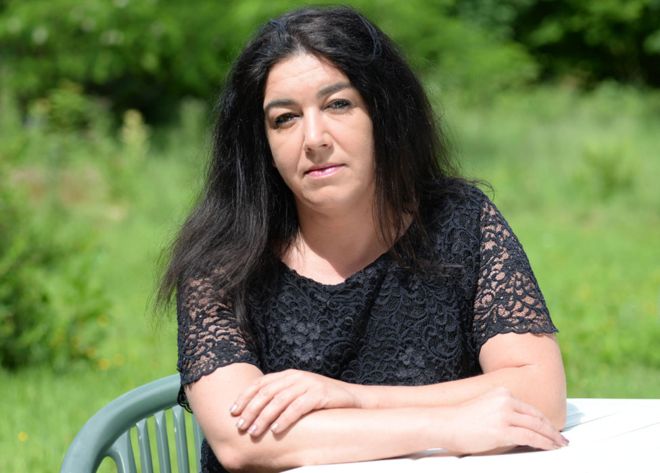April 19, 2019

The love story between an Iranian refugee who was living in the refugee camp at Calais and the French woman who used to be active in France’s anti-immigrant party continues.
The French woman, Beatrice Huret, helped the Iranian, Mukhtar, get a boat to sail for England, where Mukhtar was arrested a year ago, as the Iran Times reported back then.
Mukhtar has since been granted asylum by Britain and he now lives in Sheffield.
Beatrice was arrested by France for helping Mukhtar cross the English Channel illegally. She has since been freed, told her story in a book, “Calais Mon Amour,” and is now hoping for an English publisher. She still lives in Calais for her job. But every Friday after she gets off work, she takes the car ferry to England and then drives to Sheffield, where she arrives at 9 p.m. On Sunday afternoon, she makes the return trip.
An interviewer asked her if it was worth it. “Oh, yes,” she replied. “Because what he gives to me, nobody can give it. Real love. The sensual love. Nobody can give me this feeling.”
She was asked what she saw in the future. “Between me and Mukhtar? I don’t know. Nobody knows the future.”
Beatrice Huret did not want to fall in love. “When I looked at him for the first time, something happened. I said: ‘No! I don’t want to look at this man. It’s not possible!’”
Mukhtar was an asylum seeker from Iran, living in the dirty Jungle camp near Calais, but trying to get to England. Beatrice was the widow of a border policeman and a former supporter of the Front National, the far-right party led by Marine Le Pen that wants to kick all foreigners out of France.
They had no language in common and he could barely speak anyway, having sewn up his lips in protest at the conditions in the camp. This was three years ago in March 2016, as Beatrice remembers in the present tense. “Mukhtar comes and talks to me, just slowly because he can’t open his mouth. I understand nothing.”
She still felt attracted to him, but wanted to resist. Beatrice had come to the camp by accident in the first place while giving someone a lift. Five years after her husband’s death from cancer, the beliefs she shared with him had begun to fall away, but this was too much. “I went to the Jungle just to help, not for this. I am free. I have a good job. I have my house. I have friends. I don’t need a man in my life.”
They fell in love anyway, as Beatrice, 45, said in an interview for a BBC Radio documentary.
For Beatrice, Calais was home. For Mukhtar, it was a slum and true refuge was 21 miles away just across the English Channel, a dangerous trip for migrants who go at night and risk being run over by the shipping traffic that makes the channel like an interstate highway.
“I say it’s not possible. It’s so dangerous; there are so many boats. If you have a small boat, you can die.” The French police had demolished the Jungle and were beginning to drive migrants out of the town. Philippe Mignonet, deputy mayor of Calais, was the man responsible. This Anglophile used to work for a firm in England, but he blames Britain for creating the crisis that has tarnished the reputation of his town.
“When you are a mayor of Calais, you wake up migrants, you eat migrants, you dream migrants, you sleep migrants, because it’s that all the time and we’re frustrated about it.” There are only 400 migrants left now in Calais, he says. The police break up any new camps that emerge. “Here the aim is to keep the pressure at a level where they will understand not to come to Calais because whatever way you use, you’ll be unable to cross.”
Beatrice may once have applauded that stance, but not after meeting Mukhtar. The 38-year-old teacher left Iran because he was a Christian. Having failed to sneak onto trucks going through the Chunnel to England, his friends suggested a boat. “They said: ‘We have nothing to lose now’.”
If Mukhtar was in love with her too, didn’t he have rather a lot to lose? Beatrice says, “Yes, but he still wanted to do it. I said: ‘I don’t want to catch you and put you in a cage like a bird’.” The refugees asked her to buy a Zodiac dinghy.
“I said no, it’s not possible. You can die. You must have a real boat. And I found one. A boat to go fishing. I think: ‘If I am lucky it will keep raining for 10 years and they will never cross’.” Instead she found herself on the beach at 4 a.m. “I say: ‘This is the last time I will see you. I’m sure something will happen and you will die’.”
Mukhtar and his two friends were rescued three miles off the coast of Dover. “The water was inside. The boat was sinking. They nearly drowned. And a boat came to pick them up.” They were very fortunate indeed, she says in the BBC program. “I don’t want to be an example, to say it’s not a problem, because it’s very dangerous to cross. They were very lucky to arrive alive.”
And now they see each other every weekend—but worry that Brexit may make it harder to meet.